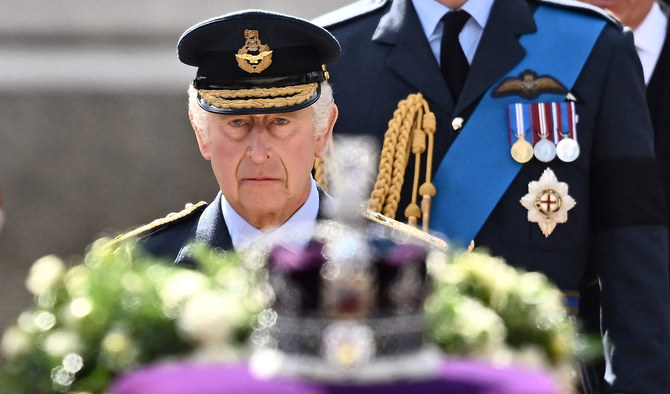LONDON: After waiting longer than any British heir to become monarch, King Charles has quietly settled into his new role with little of the drama some commentators had expected, but with family divisions and some fundamental issues still looming.
The 74-year-old Charles, who will be formally crowned on Saturday, was the oldest sovereign to take the throne in a lineage that dates back 1,000 years when he succeeded his hugely popular mother Queen Elizabeth after her death last September. She had reigned for 70 years.
Since then, while the new king has given glimpses of future changes to the institution, the man who was known for his forthright defense of the environment while prince of Wales has not continued to voice the strong views that some critics believed would damage the institution.
“I think we are all quite surprised at how well King Charles has begun,” royal author Tina Brown told Reuters.
In recent years Charles had said he well understood that when he became head of state he could no longer engage in some of the campaigning he had done as heir, and as promised, there have been no fireworks.
Charles does not enjoy same support as his widely admired mother, but his public approval ratings are generally positive. An opinion poll last week showed many more people holding favorable views of him than negative, although there also appeared to be a wide segment of indifference — people who didn’t hold a view either way.
“I think he has struck the right notes,” Harshan Kumarasingham, senior lecturer in British politics at the University of Edinburgh, told Reuters.
“He hasn’t completely jettisoned all the things of his mother’s reign but he has tried to put his own stamp on the monarchy and on Britain.”
However, some dark clouds remain for Charles.
Republican sentiment — almost entirely publicly absent during Elizabeth’s reign — has become visible, with eggs thrown at the king and his wife Camilla on one trip, and small groups of protesters voicing opposition at others.
Buckingham Palace has backed research into the monarchy’s links to slavery amid growing calls, not least from some of the 14 realms where Charles is also king, for apologies and reparations.
The Guardian newspaper has run a series of articles raising questions about the opaque nature of the wealth and finances of the institution and the family, an issue that resonates at a time when Britons are facing a cost of living crisis.
Charles told the British government in January he would like an expected surge in profit from a 900 million pound ($1.1 billion)-a-year wind farm deal for the Crown Estate to go to the “wider public good” rather than to the royal family.
PROBLEMS FROM WITHIN
As often is the case for the House of Windsor, its greatest problems come from within. The issue of how to treat his younger brother Prince Andrew is still unresolved after Andrew settled a US lawsuit in which a woman accused him of sexual assault.
Andrew has not been charged with any criminal offense and has always denied any wrongdoing.
Last month his ex-wife Sarah Ferguson, the Duchess of York with whom he remains close, said in a TV interview Andrew was a good man who should be allowed to rebuild his life.
For Charles, the most prominent issue remains the ongoing conflict with his younger son Prince Harry.
From his memoir “Spare” to a Netflix documentary and TV interviews, Harry has lambasted Buckingham Palace and his family for failing to protect him and his wife Meghan from tabloid press intrusion, and has even accused some of them — notably his stepmother Camilla — of being in cahoots with the papers.
Harry’s presence at the coronation and Meghan’s decision to stay at home in California with their two children has dominated much of the news coverage ahead of the May 6 event, along with his ongoing court battles with newspaper publishers.
“I think that the Prince Harry revelations are very personally shattering for the new king because it’s his son, someone he was actually very devoted to and I think still is. And so he feels very wounded,” Tina Brown said.
However, other royal commentators believe the furor around Harry will blow over as the royals simply get on with their jobs attending official engagements and supporting charities.
“Whenever a Harry outburst takes place, at the time everyone is open-jawed and goes ‘oh my gosh this is extraordinary how can the monarchy get over this’ but a few days later it just passes by,” said Robert Hardman, a long-time royal correspondent and author of “Queen of our Times.”
He said the royal family’s tactic of ‘don’t apologize, don’t explain’ — exemplified by Buckingham Palace’s silence over Harry’s claims — was “holding good.”
“This constant hurling of accusations and complaints, it’s starting to wear a bit thin,” Hardman said. “I think the public are thinking we’ve kind of heard all that, but normal life continues.”
























